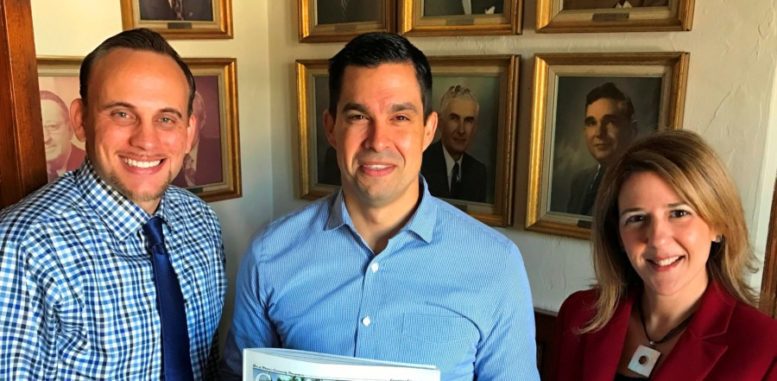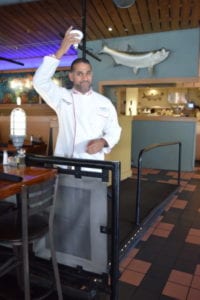

The City of Coral Gables recently got a green light by the courts to proceed with a pilot program to ban commercial use of expanded polystyrene, better known as Styrofoam. This long-awaited plan introduced by Commissioner Vince Lago further demonstrates this city is serious about sustainability.
It has been about four years since this life-long Gables resident stepped into City Hall as a first-time commissioner with a mission to change the perception that his city is lagging in the area of environmental protection. As a child, he had a passion for the coastal waters of Coral Gables and the pine rocklands around San Amaro Drive where he grew up.
And he still does. Deeply.
Commissioner Vince Lago came into office believing that the number one objective as a public servant is to maintain public safety – and that number two is pushing the cause of sustainability.
So despite heavy push back from special interests, corporate lobbyists, and some state representatives on his municipal ban on Styrofoam take-out containers and coffee cups, Lago is staying the course to ensure Coral Gables continues to emerge as a leader in environmental protection.
“The perception out there was that Coral Gables had been turning a blind eye to environmental causes for so long, but you can’t be the ‘City Beautiful’ without actually putting your money where your mouth is,” he said. “People come to our city and to South Florida to enjoy its natural splendor – and without protecting it, I see us in big trouble.”
“As a responsible elected official, it’s not just about doing any harm to the environment, it’s about ensuring and preserving our responsibility and indeed our obligation to lead by example – and there can be no excuses,” he added.
Aside from his own at-home campaign to make his family residence more energy efficient by installing 40 solar panels, LED lighting, and other green measures, Lago has spearheaded multiple successful efforts at the city level including the establishment of Coral Gables’ first-ever Sustainability Master Plan and the purchase of 20 all-electric vehicles and charging stations. And although he paid in full for his solar permits, he changed the process for future homeowners allowing them to get Coral Gables solar permits “for free” as an incentive.

Lago also worked to enact a requirement that all buildings with a footprint of more than 20,000 square feet would be built in an environmentally responsible way and is presently overseeing the conversion of existing cobra-head street lighting to all LED lamps.
Most recently he led the way in a commission action that will ultimately result in a citywide ban on single-use plastic carry-out bags, an effort that mirrors the process behind the successful roll-out of his expanded polystyrene ban.
“All of these actions serve to ensure people that we are moving in the right direction. It instills the idea that ‘if my city is doing it, I can do it too’.”
Lago notes that the city’s polystyrene rule presently allows Styrofoam products to be used where it is currently prudent and required, such as meat and egg packaging, but he believes this eventually can – and should – change.
He says cities are becoming more deliberate with regards to understanding that sustainability is not an option. He has even been approached by other cities throughout Florida for copies of the city’s innovative legislation. “It’s a lifestyle,” he says, “and there is no reason why you cannot become more sustainable. There are no longer reasons why not to do it.
“If enough cities follow suit and put financial pressure on corporations, they’ll begin to offer such simple alternatives as the use of all-paper cartons in the sale of eggs, for instance, all the time.”
Attack on the Ban
So when Coral Gables’ ban on use of expanded polystyrene came under attack last year by special interest groups and the Florida Retail Federation – right in the middle of the city’s legislative and outreach process – Lago and his fellow commissioners vigorously fought for their “home-rule” right to enact their new Styrofoam rule.
And the city won. Just weeks ago, a Miami-Dade City Circuit Judge Jorge Cueto ruled to uphold Coral Gables’ ban, saying that the city not only has the right to create its own rules for governing, but that a state law enacted in 2016 specifically targeting Coral Gables from enforcing its ban was unconstitutional.
This new state law, pushed by major retailers like Publix and 7-Eleven, prohibits any further legislation by municipalities wishing to ban the use of polystyrenes until a study is done to measure the impact of such rules on food safety. The law also is said to help mitigate concerns by retailers that there are too many differing regulations across municipal and county lines.
But Lago and other city leaders see the most pressing issue surrounding Styrofoam plates, cups, egg cartons, and take-out containers is that they are simply not recyclable. And that’s because there is virtually no market to recycle such plastic-based products as polystyrenes due to their weight – or the lack thereof.
“To recycle any material you have to compress it, take it to a plant where they weigh it, and then they give you a certain dollar amount in return, whether it’s tin, copper, paper, or glass. The problem with expanded polystyrene is there is no return. It has next to no value because of the off-the-charts volume that you would have to gather for recycling – it just doesn’t make sense. But more importantly – the tremendous cost to our environment and to our children’s future – is just too great.”
So with no recyclable value it Styrofoam products often end up tossed aside, into the environment where they break up into thousands of little pieces and become a major nuisance for sea turtles, fish, and birds – sometimes resulting in death. And the expanded polystyrene that does enter the waste stream won’t biodegrade for up to 500 years. Another major nuisance is that polystyrenes inhibit the proper breakdown of landfills since it interferes with percolation of water through the landfill.
A Long Haul
Even without the legal challenges Coral Gables faced in implementing its ban, it has been a long and arduous process to get the rule in place.
In the months leading up to final approval, dozens of meetings were conducted with businesses and residents in order to get community buy-in, and they had to set in place regulations related to compliance.
Lago and city staff sat with the Coral Gables Chamber of Commerce and members of the Business Improvement District (BID) to discuss the impact the ban would have on the commercial sector. “It was important that everyone understood we are not just banning for the sake of banning. We wanted to discuss the reasons why this policy is beneficial to the community as a whole” Lago commented.
After vetting the rule thoroughly and conducting community outreach, Lago stated that “most everyone came to the same conclusion that it’s really just a matter of ‘lack of education’ that any business would continued using Styrofoam products. We’re beyond using complacency as an excuse. We’re a very civilized society that needs to be accountable to the environment,” he said.
“I’m a firm believer that we don’t own the environment, rather, we’re stewards of the environment. And we need to do everything in our power to use products that are recyclable, and sustainable,” he added.
Business Community Support
This sentiment has been echoed by dozens of Coral Gables retailers and restaurateurs, such as Wayne Eldred, owner and head chef of Tarpon Bend Raw Bar & Grill on Miracle Mile.
“The elimination of expanded polystyrenes is one of simpler things we can do – it’s a very easy first step leading to the many positive outcomes we could see by putting into place sensible policies and procedures that protect the environment,” he said.
As a business owner and as immediate past chair of the Coral Gables Chamber of Commerce, one of things Eldred says he’d like to see city leaders continue to explore “appropriate ways to make Coral Gables more sustainable, cleaner, and more responsible with regard to the carbon footprint we have on our town.”
And that’s exactly what he and his team are now doing at Tarpon Bend. Each year, they consider newer and better solutions to reduce the restaurant’s impact on the environment. “It’s the right thing to do and we’ve got to start somewhere,” he added.
In fact, Eldred recently he switched out all the lighting in the restaurant and installed LED lamps, and while these new lights were not inexpensive, they did end up lowering the heat impact within the restaurant, which in turn lowered the air conditioning bills.
“So the change not only helped us with our overhead costs but helps the environment, too.”
Eldred says he travels a lot for business and pleasure, and when he’s out on the road, he sees so many cities doing so many things to help the environment. “And there’s no reason we can’t do the same thing right here in Coral Gables.”
That’s the exact community sentiment that feeds Lago’s desire to continue to make Coral Gables a beacon of environmental responsibility for other cities to see and exemplify.
Says Lago, “We are leaders on so many fronts. We are leaders when it comes to municipal design, aesthetics, and the quality of zoning requirements. But great cities not only need to protect aesthetics – they must protect the environment. After all what legacy is there if our environment is destroyed by our failure to act?”






Comments are closed.